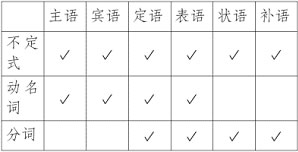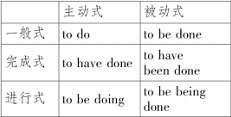| 英语通高中一年级版:非谓语动词用法透析 |
| http://www.sina.com.cn 2004/08/10 14:50 英语辅导报 |
非谓语动词是中学英语学习中的一个难点,又是重点的语法项目。它是构成句子的一个重要组成部分,掌握它的用法,会使你对英语句子的理解和运用上一个台阶。根据笔者多年的教学经验,同学们应从以下几个方面去学习,会让你有种豁然开朗的感觉。
 一、不定式 1. 用法:1)主语:To help each other is good. =It is good to help each other. 2)宾语:She wishes to be a doctor. 3)定语:Is this the best way to help him? 4)状语:Every morning he gets up very early to read English. 5)表语:My job is to drive them to the power station every day. 6)宾补:I saw a little girl run across the street.(为省略to的动词不定式) 2.构成:
 3.不定式短语:"疑问词+不定式" She didn't tell me what to do. 4.不定式的复合结构:It's time for us to have a class. It's kind of you to help me. 二、动名词 构成:doing 1.用法:1)主语:Swimming is good for us. 2) 宾语:I love singing. 3) 表语:His hobby is collecting stamps. 4) 定语: There is a swimming pool. /There is a pool for swimming. 2.动名词复合结构:由形容词性物主代词或名词所有格+doing 构成, 也可用其宾格或名词+doing (位于句首时只能用前一种) Do you mind my(Tom's) closing the door? =Do you mind me(Tom) closing the door? 三、分词 现在分词:doing 过去分词:done 1.用法:1)定语: The boy standing under the tree is our monitor. The novel written by Lu Xun is worth reading. 2)状语:She sat at the desk reading a newspaper. Being ill, he went home. He appeared, followed by a little boy. Seen from the hill, the park looks very beautiful. 3) 表语:The film is very interesting. (表示主语的性质、特征)(使……) I'm interested in this story.(表示主语所处的状态)(感到……) 4) 宾补:I am sorry to have kept you waiting. He was surprised to find the flower-pot broken. 2.区别:现在分词表示主动和正在进行,而过去分词表示被动和已完成。 非谓语动词解题技巧 主语 不定式和动名词都可以作主语,区别是:不定式强调动作。如:To teach the students in Class Three next term is her given task. 而动名词则侧重概念。如:Skating is a good sport. 宾补 不定式和分词都可以作宾语补足语。区别:1.不定式表示做过或将要做的动作。如: I saw him enter the classroom. / I want to buy a pen for my child. 现在分词表示正在进行的动作。如:I heard her singing an English song. 过去分词则表示被动或完成意义。如:He'll have his hair cut. 2.有些动词要求不定式作宾语补足语,不可以用现在分词。如:He made me say so. (为省略to的动词不定式)而有些动词要求用现在分词作宾语补足语,不可以用不定式。如:The teacher kept them reading the text. 状语 不定式和分词都可能作状语,但它们的种类是不同的。 不定式能作目的状语。如: I go to his house every day to help him with his English. 作结果状语。如: He worked hard enough to be praised by his teacher. 作原因状语(这种状语一般在形容词后面作形容词的状语)。如:I am glad to see you. 分词能作时间状语。如:Walking along the street, I met an old friend of mine. 作条件状语。如:Taken in time, the medicine will be quite effective. 作方式或伴随状语。如: He came running back to tell me the news. 又如:Laughing and talking, the students went out of the classroom. 作原因状语(一般前置,作动词或句子的原因状语)。如:Not knowing his telephone number, we couldn't get in touch with him. 定语 不定式、分词和动名词都可以作定语,区别是:不定式动作意味强,如:He had only one room to live in. 现在分词表示它所修饰的名词的动作,如: The crying boy is my younger brother. 过去分词表示过去的动作造成的后来的状态,如:This is a broken bowl. 动名词表示用途,如:There are a few sleeping bags in the shop. 表语 不定式、分词和动名词都可以作表语,区别是:不定式和动名词作表语都表示主语的内容,但前者动作意味强,如: His job is to teach the students in Class Two next term. 而后者概念意味强,如:Her job is raising pigs. 现在分词表示主语的性质和特点,如:The story is exciting. 过去分词表示主语的状态,如:They were interested in the story. 宾语 不定式和动名词都可以作宾语,为了方便记忆,现总结一些技巧和口诀: 只能接动名词作宾语的动词: 建议停止享受--想象完成逃跑(suggest, advise, stop, resist, enjoy, imagine, finish, escape) 承认借口--推迟实践(admit, excuse, delay, practise) 认为应该保持头脑清醒--懂得避免冒险(consider, keep, mind, understand, avoid, miss, risk) 另外还有几个短语: succeed in, be busy, be worth, be used to, give up, look forward to 只能接不定式作宾语的动词: offer(提出), learn(学会), intend, plan(打算), demand, ask(要求), promise (答应), help (帮忙), prepare (准备), decide, determine (决定), refuse (拒绝), dare(敢于), manage(设法), wish, hope want, expect(希望,想要), fail, pretend (假装), choose(甘愿) 同意提出学会的打算,要求答应来帮忙。 准备决定遭拒绝,敢于设法有希望。 未能做到莫假装,选择破釜沉舟当自强。 既能接不定式,又能接动名词,但意思不同的动词或词组: forget, go on, mean, remember, stop, try, regret,巧记, 即"四'记'力争不后悔"。四记指(记得/记住;忘记;计划/打算;继续);力争指try;不后悔指 "stop regretting"-stop 与regret。如: 1. The doctor tried to cure the woman of her illness, so he tried treating her with a new medicine. 2. The teacher asked us to go on reading the text instead of going on to do the exercises. 3. What a poor memory!I forgot borrowing money from him yesterday. But today I forgot to return the money to him again. 4. The pupils stopped to write their compositions when the teacher said angrily, "Stop talking, children." 5. I regretted to tell him that he had been dismissed. To my surprise, he said to me, " I have no regrets, I only regret having taken the wrong job." 6. I can't help thinking he's lying, so I can't help to apologize for him. 7. "Remember to return the bat to me." "But I remember having returned it to you." (文/黄兴元;英语通高中一年级版 03~04学年第5期; 版权归英语辅导报社所有,独家网络合作伙伴新浪教育,未经许可,不得以任何形式进行转载。) |
| 【英语学习论坛】【评论】【大 中 小】【打印】【关闭】 |